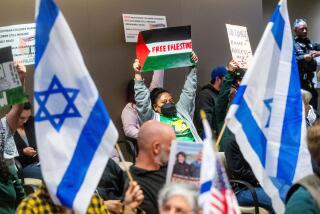Mild Bosnia Stance Embarrassed U.S.
- Share via
UNITED NATIONS — The Clinton Administration, calling its first emergency meeting of the Security Council, was prepared to push through a mild, evenhanded statement about violence in eastern Bosnia-Herzegovina this week until a rebellion by weaker countries embarrassed the United States into condemning the Serbs and their alleged atrocities, sources said Thursday.
The machinations behind closed U.N. doors, revealed by one of the ambassadors present, raise questions about the focus and determination of Administration policy on the complex, horrendous war in the Balkans.
Ambassadors were reportedly astounded that the first draft of the Bosnia statement, presented to all members of the council on behalf of U.S. Ambassador Madeleine Albright, contained no reference at all to the Serbs but simply demanded that “all sides” to the conflict “immediately cease military action throughout Bosnia and Herzegovina.”
This prompted Venezuelan Ambassador Diego Arria to demand that council members identify the culprits. “There are no ghosts here,” Arria said. “The people who are committing atrocities have uniforms. They have ranks. We should have names.”
Albright, although a request was made of her office, did not offer her version of the closed events.
But some diplomats suggested that the United States had offered a weak resolution to satisfy the Russians, who are under domestic pressure not to abandon their traditional Serbian allies, and to avoid antagonizing the Bosnian Serbs, who are engaged in protracted, tense peace negotiations at the United Nations.
That, however, raised the question of why the Administration, armed with classified documents from the Office of the U.N. High Commissioner for Refugees about possible massacres and atrocities in eastern Bosnia, bothered to call the emergency meeting, if it only intended to produce a timid Security Council statement.
The first draft was presented to council members after it had been approved already by the five permanent members: the United States, Russia, Britain, France and China.
Several other ambassadors received their copies of the proposed council statement while attending a meeting of the Nonaligned Movement, the organization of largely Third World countries that have kept their odd name even though the Cold War has ended. Ironically, Bosnian President Alija Izetbegovic was addressing them as the copies arrived.
The wording of the draft with its failure to condemn the Serbs infuriated Izetbegovic, and his anger proved persuasive with several of the ambassadors.
When the ambassadors showed up for the closed council meeting, a member of the American delegation reportedly approached them and warned them not to foul up the process. If the draft were not approved in its present form, he reportedly told them, the peace negotiations would collapse.
This argument did not sound persuasive, and word of the discontent reached Albright. She then agreed to meet with several of the Third World ambassadors privately before the full council session.
The ambassadors explained that they found the draft hopelessly inadequate. “She is extremely sensitive,” said Ambassador Arria. “You could see in her eyes that she was in total agreement with us. She said she was trying to introduce a statement that would keep everyone on board. But I knew that if she had been sitting in my shoes, she would have said the same things that I did.”
Once the council session began, Arria spoke about “the lack of ghosts in eastern Bosnia,” and the need for placing blame. He said that Bosnian Serb leader Radovan Karadzic, who had once described the Muslims as rats, was now hunting them down like animals.
Ambassadors Andre Erdos of Hungary, Roble Olhaye of Djibouti and Jamsheed Marker of Pakistan also urged the council to toughen the measure. Throughout these arguments, Russian Ambassador Yuli Vorontsov did not say a word, thus offering no opposition to the demands for a condemnation of the Serbs.
After two or three hours of drafting, the Security Council, with American approval, then produced a new draft statement. It minced no words as it condemned the Serbian killing of civilians in Eastern Bosnia.
The Security Council then moved into public session, and Ambassador Terrence Christopher O’Brien of New Zealand, president of the council this month, read the unanimously approved statement.
More to Read
Sign up for Essential California
The most important California stories and recommendations in your inbox every morning.
You may occasionally receive promotional content from the Los Angeles Times.













